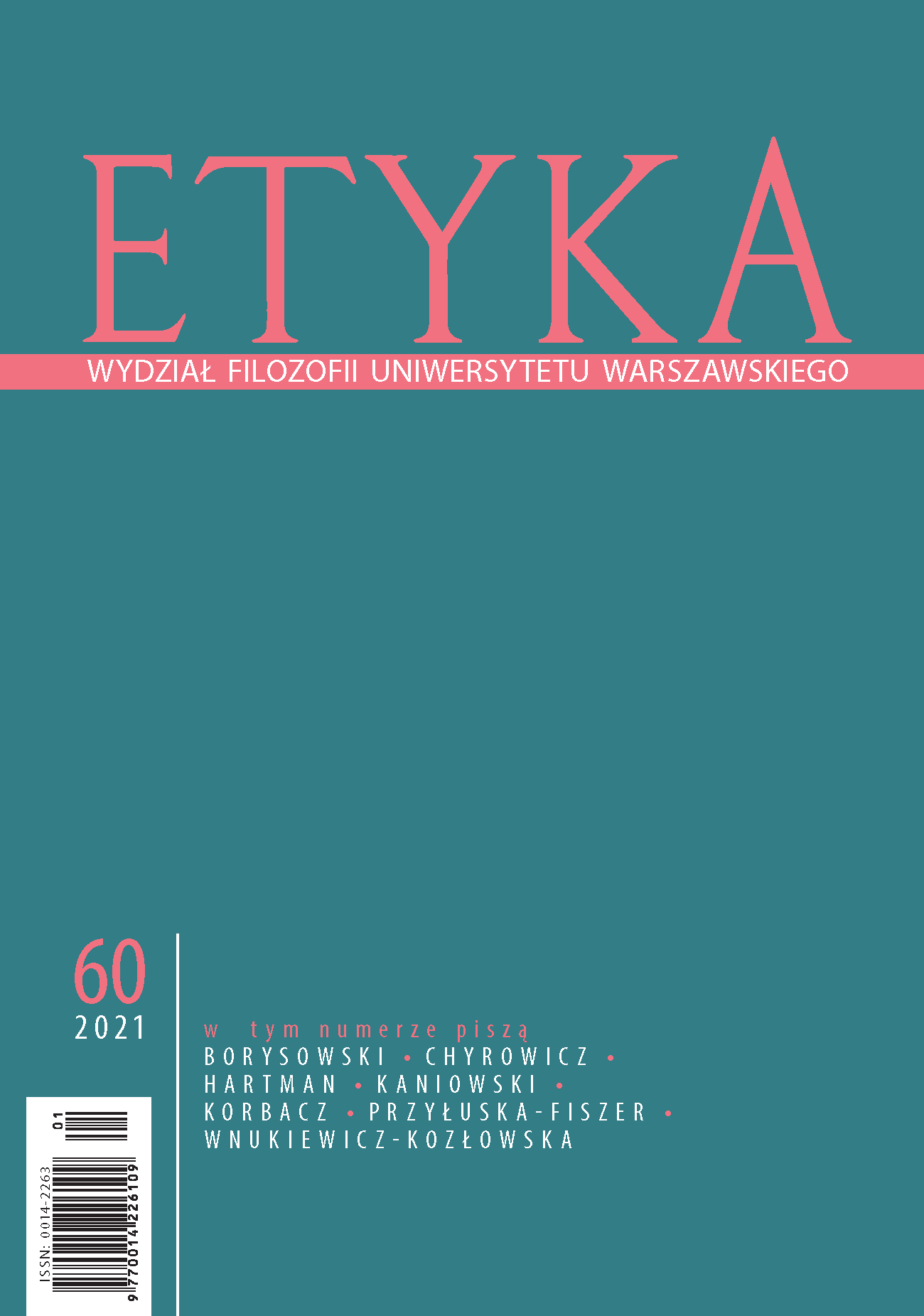Presuppositions and models of participatory bioethical debate
Keywords:
Bioethics, participatory debate, discourse, dialogue, democracyAbstract
Participatory bioethical debate is a form of civic participation and a form of discourse. The article presents some paradigmatic examples of participatory debates, including bioethical debates. Then, different approaches and ways of understanding “debate” are also discussed, as well as “discussion”, “dialogue” and especially important in this context form of communication and form of interaction, which is “discourse”. Among the numerous examples of participatory bioethical debates which have been carried out in many Western countries over the last three decades, an interesting example of education which prepares people to participate in participatory bioethical debates is presented. The project prepared in the formula of diskurslernen («learning to participate in discourse and, at the same time, learning through discourse») deserves attention for the fact that it is a project preparing to participate both in civic participatory debates and in general to participate in the procedures of democratic opinion-forming and will-forming. Despite some misgivings as to whether participatory debates do not sometimes serve purposes other than their declared ones, their organization and popularization is something necessary both from the point of view of the discipline itself, which is bioethics, and above all from the point of view of the form of democracy to which it has come in its development in modern societies of the Western world.
References
Abels, G. [w zapowiedziach]. „Der Ethikrat soll kein Ersatzparlament sein. Zum Verhältnis von Nationalem Ethikrat und Deutschem Bundestag.“ W: Welche Autorität haben nationale Ethik-Komitees?, M. Kettner (red.). Münster: LIT.
Andersen, I-E., Jæger, B. 1999. „Danish participatory models. Scenario workshops and consensus conferences: towards more democratic decision-making”, Science and Public Policy, vol. 26, nr 5: 331–340.
Baumgartner, H.-M., „Przemiany pojęcia rozumu”, tłum. A.M. Kaniowski. W: tenże, Rozum skończony, 189–223. Warszawa: Oficyna Naukowa.
Gill, B., Dreyer, M. [w zapowiedziach]. „Statt Nationalem Ethikrat: Mit dem Dissens leben! Dezentrale Diskursverfahren in der Zivilgesellschaft.“ W: Welche Autorität haben nationale Ethik-Komitees?. M. Kettner (red.). Münster: LIT. http://b-gill.userweb.mwn.de/publika/A031.pdf (dostęp: 12.06.2022).
Blumenberg, H. 1950. Die ontologische Distanz. Eine Untersuchung über die Krisis der Phänomenologie Husserls [dysertacja – manuskrypt nieopublikowany] Kiel.
Bogner, A. 2005. „Moralische Expertise. Zur Produktionsweise von Kommissionsethik“. W: Wozu Experten? Ambivalenzen der Beziehung von Wissenschaft und Politik, A. Bogner, H. Torgersen (red.), 172–193. Wiesbaden: VS Verlag für Sozialwissenschaften.
Bogner, A., Menz, W. [w zapowiedziach]. “Braucht die Politik den Expertenkonses? Zur rolle bioethischer Expertise in der reflexiven Moderne.“ W: Welche Autorität haben nationale Ethik-Komitees?. M. Kettner (red.). Münster: LIT.
Böhler, D., Gronke, H. 1994. „Diskurs”. W: Historisches Wörterbuch der Rhetorik, G. Kalivoda, H. Mayer, F.-H. Robling (red.). Bd. 2, szp. 764. Tübingen: Max Niemeyer Verlag.
Böhler, D., Katsakoulis, G. 1994. „Diskussion“, W: Historisches Wörterbuch der Rhetorik, G. Kalivoda, H. Mayer, F.-H. Robling (red.). Bd. 2, szp. 819. Tübingen: Max Niemeyer Verlag.
Buber, M. 1992. Ja i Ty: wybór pism filozoficznych, tłum. J. Doktór. Warszawa: Pax.
Coote, A. 1997. Jo Lenaghan, Citizens‘ Juries: Theory into Practice. London: IPPR.
Fuchs, M. 2005. Nationale Ethikräte. Hintergründe, Funktionen und Arbeitsweisen in Vergleich”. Berlin: Nationaler Ethikrat.
Gill, B., Dreyer, M. 2001. Internationaler Überblick zu Verfahren der Entscheidungsfindung bei ethischen Dissens. Gutachten im Auftrage der Enquete-Kommission ‚Recht und Ethik der modernen Medizin‘ des deutschen Bundestages.
Gmeiner, R. 2005. „Nationale Ethikkommissionen: Aufgaben. Formen, Funktionen”. W: Wozu Experten? Ambivalenzen der Beziehung von Wissenschaft und Politik, A. Bogner, H. Torgersen (red.), 133–148. Wiesbaden: VS Verlag für Sozialwissenschaften.
Hess-Lüttich, E.W.B. 1994. „Dialog“. W: Historisches Wörterbuch der Rhetorik, G. Kalivoda, H. Mayer, F.-H. Robling (red.). Bd. 2, szp. 607. Tübingen: Max Niemeyer Verlag.
Joss, S. 2003. „Zwischen Politikberatung und Öffentlichkeitsdiskurs – Erfahrungen mit Bürgerkonferenzen in Europa“. W: Bürgerkonferenz: Streitfall Gendiagnostik. Ein Modellprojekt der Bürgerbeteiligung am bioethischen Diskurs, S. Schicktanz, J. Naumann (red.), 15–35. Dresden: Auftrag des Deutschen Hygiene-Museums.
Kettner, M. (red.). (w zapowiedziach). Welche Autorität haben nationale Ethik-Komitees?. Münster: LIT.
Kolbe, Ch., Heyer, M. 2009. „Bioethische Diskurse erlernen und erleben. Diskursinitiativen als Teilaufgabe bioethischen Arbeitens“. Jahrbuch für Wissenschaft und Ethik, vol. 14, nr 1: 169–194.
Nanz, P., Fritsche, M. 2012. Handbuch Bürgerbeteiligung. Verfahren und Akteure, Chancen und Grenzen. Bonn: Bundeszentrale für politische Bildung (dostęp: 31.05.2022).
Rosenthal, C. 2011. Lessons from Aquinas. A Resolution of the Problem of Faith and Reason. Macon, Georgia: Mercier University Press.
Scheliermacher, F. 1988. Dialektik. Hamburg: Felix Meiner Verlag.
Schild, H.J. 1994. „Debatte”. W: Historisches Wörterbuch der Rhetorik, G. Kalivoda, H. Mayer, F.-H. Robling (red.). Bd. 2, szp. 413 [413–423]. Tübingen: Max Niemeyer Verlag.
Schuler, K. 2015. „Die Regierung will reden. Die Zeit, 13.
The Jefferson Center for a new Democratic processes. 1993. Citizens Jury on America’s Tough Choices. https://cndp.us/wp-content/uploads/2012/10/Healthcare-Reform.pdf (dostęp: 12.06.2022).
Theunissen, M. 1965. Der Andere. Studien zur Sozialontologie der Gegenwart. Berlin: Walter de Gruyter.
Viehöver, W. 2005. „Der Experte als Platzhalter und Interpret moderner Mythen. Das Beispiel der Stammzelldebatte”, W: Wozu Experten? Ambivalenzen der Beziehung von Wissenschaft und Politik, A. Bogner, H. Torgersen (red.), 149–171. Wiesbaden: VS Verlag für Sozialwissenschaften.
Waldenfels, B. 1971. Das Zwischenreich des Dialogs: Sozialphilosophische Untersuchungen
Downloads
Published
Issue
Section
License
Works published in ETYKA are available under the Creative Commons Attribution No Derivatives 4.0 International Licence (CC BY-ND), which entails acknowledgement of authorship without derivative works. Under this licence, Authors keep their copyrights and agree that their works can be used again legally for any purpose, including commercial ones, except for the creation of derivative works, without the need to obtain previous consent of the Author or publisher. The articles can be downloaded, printed, copied and disseminated; under the condition that the authorship is indicated accordingly, together with the place of original publication. The Authors preserve their copyrights to the above-mentioned works without any limitation whatsoever.



